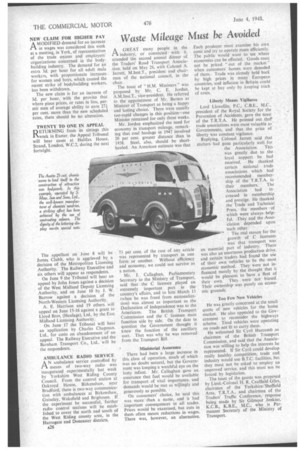Waste Mileage Must be Avoided
Page 28

If you've noticed an error in this article please click here to report it so we can fix it.
A GREAT many people in the
industry, or connected with it, attended the second annual dinner of the Traders' Road Transport Association, held on May 26, with Colonel A. Jerrett, M.Inst.T., president and chairman of the national council, in the chair.
The toast of "I-1.M, Ministers" was proposed by Mr. C. E. Jordan, A.M.Inst.T., vice-president. He referred to the appointment of Mr. Barnes as Minister of Transport as being a happy and lasting choice. There were usually too-rapid changes in this position—one Minister remained for only three weeks.
Mr. Jordan emphasized the need for economy in transport mileage, remarking that coal haulage in 1947 involved 20 per cent. greater distance than in 1938. Steel, also, should be shorthauled. An American estimate was that 73 per cent, of the cost of any article was represented by transport in one form or another. Without efficiency and economy, we could not survive as a nation.
Mr. J. Callaghan, Parliamentary Secretary to the Ministry of Transport, said that the C licensee played an extremely important part in the country's affairs, and to him March 13 (when he was freed from nationalization) was almost as important as the Declaration of Independence was to the Americans. The British Transport Commission and the C licensee must function side by side. On the date in question the Government thought it knew the function of the ancillary user. That was why he was removed from the Transport Bill.
Ministerial Assurance There had been a large increase in this class of operation, much of which was no doubt natural, but the Government was keeping a watchful eye on the lusty infant. Mr. Callaghan gave an assurance that fuel would be available for transport of vital importance, and demands would be met as willingly and generously as possible.
On consumers' choice, he said this was more than a name, and it had important consequences in all trades. Prices would be examined, but cuts in them often meant reductions in wages. There was, however, an alternative. Each producer must examine his own costs and try to operate more efficiently. The public would want to see where economies can be effected. Goods must not be priced. "out of the market" when customers' homes were denuded of them. Trade was already held back by high prices in many European countries, and inflation in Britain could be kept at bay only by keeping track of costs.
Liberty Means Vigilance Lord Llewellin, P.C.. C.B.E. M C president of the Royal Society for the Prevention of Accidents, gave the toast of the T.R.T.A. He pointed out the trade associations were most valuable to Governments, and that the price of liberty was constant vigilance.
Replying, COlonel Jerrett said that matters had gone particularly well for the Association. This was greatly due to the loyal support he had received. He thanked certain national trade associations which had recommended membership of the T.R.T.A. to their members. The Association had increased in membership and prestige. .He thanked the Trade and Technical Press, the members of which were always helpful. They and the Association depended upon each other.
The real reason for the growth of C licensees was that transport was an essential part of industry. There was also an enormous production drive, and certain traders had found the use of their own vehicles to be the most economic method. They were not influenced merely by the thought that it would be pleasant to have, a fleet of their own. They were not biased. Their ownership was purely on economic grounds.
Too Few New Vehicles He was greatly concerned at the small quota of new vehicles for the home market. He also appealed to the Government to reconsider the highways scheme. Tired vehicles were operating on roads not fit to carry them.
He welcomed Sir Cyril Hurcornb as chairman of the British Transport Commission, and said that the Association was willing to help the interests he represented. If Sir Cyril could develop really healthy competition, trade and industry would use B.T.C. facilities, but they must not be asked to employ an Improved service, and this must not be forced by legislation.
The toast of the guests was proposed by Lieut.-Colonel H. R. Caulfield Giles, chairman of the Yorkshire/Sheffield Area, T.R.T.A., and chairman of the Traders' Traffic Conference, response being made by Sir Gilmour Jenkins, K.C.B., K.B.E., Me., who is Permanent Secretary of the Ministry of Transport.
















































































